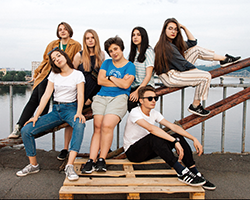From fear to fearless activism: Yana Panfilova’s story

Yana Panfilova
“I was 10 when I discovered that I was living with HIV. My mom and I were sitting in the kitchen. You know, the most important talks in my country take place in the kitchen. So, my mom asked me, ‘Do you know the name of your disease?’ I was shocked. I always felt healthy, I was not taking any medicine. What disease was my mom talking about? ‘You have HIV,’ she said. I cried.”
This is how Yana Panfilova, 20, from Ukraine, discovered that she had had HIV since she was born due to mother-to-child transmission of the disease. Her mother had used heroin while pregnant and become infected.
“At that time, I thought that HIV and AIDS were the same thing. Everybody knows that people with AIDS die soon! But my mom said that with therapy I could live a long and happy life.”
At age 11, Yana started treatment. “In Ukraine, I now have easy access to free treatment and care. However, doctors don't speak with HIV-positive teenagers about health, they speak with their parents. I think it would be more helpful if they talk to us directly, explain the disease and how we can still live with it.”
Becoming an advocate for people living with HIV
“I had a fear inside. I spent years preparing myself to tell my story to someone. When I was 14, I told my best friends. I was afraid of their reaction, but they understood everything and accepted me. It was such a relief! When I was 15, I went for a walk with my friend. We were talking about my status and my fears. And suddenly I understood: I was discriminating against myself by hiding my HIV, by not saying that HIV is a disease like others.”
At the international conference "Children and HIV" in the Republic of Moldova, Yana spoke on behalf of adolescents living with HIV in eastern Europe and central Asia. Following this speech and other advocacy initiatives, in 2013 the Ministry of Health of the Republic of Moldova introduced disability benefits for all children living with HIV.
Yana’s advocacy has also helped influence the Government of the Russian Federation to place greater focus on supporting youth living with HIV; it does so through a support group and a dedicated website for HIV-positive youth, started in 2014. “I am very proud of this!”
Yana can remember how, at 17, she thought that when she took photos with her HIV-positive friends they were supposed to hide their faces. “That’s when I started dreaming about a movement in which healthy and HIV-positive teenagers work together to create a safe space for all HIV-positive adolescents in Ukraine.” In 2015, Yana founded Teenergizer, an organization of adolescents and youth with and without HIV that also offers peer-to-peer trainings.
“I was very lucky to be raised in a family where everybody knew all about HIV, but it is not always like this. After years of work with teenagers in Ukraine and other eastern European and central Asian countries, I have learned that most of them have had no chance to receive adequate information about HIV at school or at home. That’s why I am convinced that peer-to-peer trainings are so important. The impact that they have on a teenager’s mind is much better than any school lesson or lecture from a doctor. Teenagers are much more open to information they receive from people of their age.”
Today, Yana is a student of social work. Since 2015, she has also been a member of the Steering Committee of the Global Network of Young People Living with HIV (Y+). She spoke about HIV-positive teenagers from countries in eastern Europe and central Asia at the United Nations General Assembly High-level Meeting on Ending AIDS in 2016. She also represented people living with HIV at the policy dialogue on HIV and related comorbidities, organized by WHO, UNAIDS and the Government of the Netherlands on the eve of the 22nd International AIDS Conference in Amsterdam. “I hope that this form of dialogue, involving representatives from civil society and people affected by HIV, will continue across countries in eastern Europe and central Asia.”



